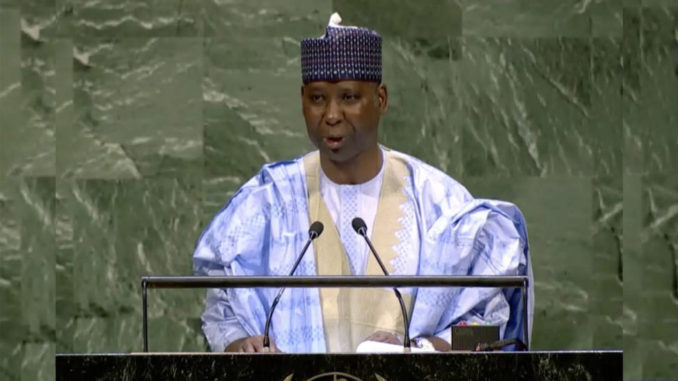
It is one good, heartwarming news that Nigeria’s Permanent Representative at the United Nations (UN), Professor Tijjani Muhammad-Bande was recently elected unopposed to preside over the 74th Session of the UN General Assembly (UNGA) effective from September. He is the second Nigerian to occupy the exalted position after Gen. Joseph Garba who presided over the 44th Session of UNGA (1989-90). Muhammad-Bande’s election is one good news for this country in the face of the many unhappy incidents – daily acts of criminality and general insecurity in the land – that dominate the news space. But we should say quickly that recognition on the global stage should not at all obviate the urgent necessity for a better-governed Nigeria.
Indeed, this development should communicate to managers of our public affairs the great possibilities of this country as well as equally great expectations from us by the outside world. It is noteworthy that Nigeria is one of only three countries that have occupied the UNGA presidency twice. The others are Argentina and Ecuador.
Prof. Muhammad-Bande brings to his coming assignment enough body of intellectual capability, exposure and experience to make a difference that will do his country and Africa proud. A 1979 graduate of Political Science from the Ahmadu Bello University, Zaria, Nigeria, he also holds higher degrees from Boston University (U.S.) and University of Toronto (Canada). Muhammad-Bande has been Vice-Chancellor of the Usmanu Danfodiyo University in Sokoto, Director-General of the elite National Institute for Policy and Strategic Studies (NIPSS) Kuru, Plateau State and before then Director-General of the African Training and Research Centre in Administration for Development, Tangiers, Morocco.
In one sense, Muhammad-Bande is one of us. He was a visiting member of the Editorial Board of The Guardian before his appointment as university Vice Chancellor. He was appointed Nigeria’s Permanent Representative (PM) to the United Nations in 2017. At the UN, the professor served as one of the vice-presidents of the 71st Session of the General Assembly, besides chairing a number of committees of the world body. Experience garnered from these exposures will surely stand Muhammad-Bande in good stead come September 2019.
Muhammad-Bande will preside over UNGA – meaning that he will sit in authority, exercising guidance and direction in the conduct of an assembly of 193 nations, with the Holy See and Palestine as observers. Rule 35(106) of the Rules of Procedure requires the president to “declare the opening and closing of each plenary meeting of the session, direct the discussions in plenary meeting, ensure the observance of these rules, accord the right to speak, put questions and announce decisions. He shall also rule on point of order and, subject to these rules, shall have complete control of the proceedings at any meeting and over the maintenance of order thereat.” He is empowered to limit time allotted to a speaker, the number of times a representative may speak, suspend the debate of an item or adjourn a meeting.
However, these powers are not at all absolute and unfettered. Rule 36 (107) states that, “The President, in the exercise of his functions, remains under the authority of the General Assembly.”
The General Assembly, one of the six main organs of the United Nations, is the main representative organ that deliberates upon and makes policy binding on all members who carry equal weight on the basis of sovereign equality of states. The UNGA discusses, debates and arrives at a consensus that spells out its position on the hugely multi-dimensional matter of international peace and security. This includes disarmament, international law, international cooperation, human rights, the environment, social, cultural, health and education issues. It sets agenda for and also deliberates on the reports of the activities of the other organs. This, then, is the demanding responsibility that our man at the UN will shoulder for the one-year UNGA session starting this September.
In a global organisation composed of diverse and often divergent positions of members-states, some extremely powerful and influential, it is, indeed, a huge responsibility that demands the utmost and broadest knowledge, persuasion and lobbying skill to close gaps in points of view, direct national and indirect vested interests to reach a consensus. The challenge of the UN is, as put by a former Secretary-General Ban Ki-Moon, “to close the gap between the world as it is and the world as it should be.” This is the goal for Muhammad-Bande to pursue during the 74th session of UNGA. He will need of course, the commitment, political and material support of his home country in particular and Africa in general to do a respectable job. We should expect the African Union (AU) to take a keen interest in the performance of this African.
There is always a cost to high office, status and greatness. Muhammad-Bande as UNGA president will be a global servant whose purview is the global village and whose concern will be for the best interest of all citizens of the world. Nevertheless, with effective lobbying and trading-off of needs among member-states, he certainly can push to the front burner of deliberation and collective action economic, security, human rights, and other development issues that are of pressing concern to Africa.
It bears repeating that this is the time Nigeria must not, for whatever reason, deny Muhammad-Bande the financial, diplomatic, political and any other resources he needs to succeed. We wish him every success, for the sake of Nigeria, Africa and the world.
END

Be the first to comment